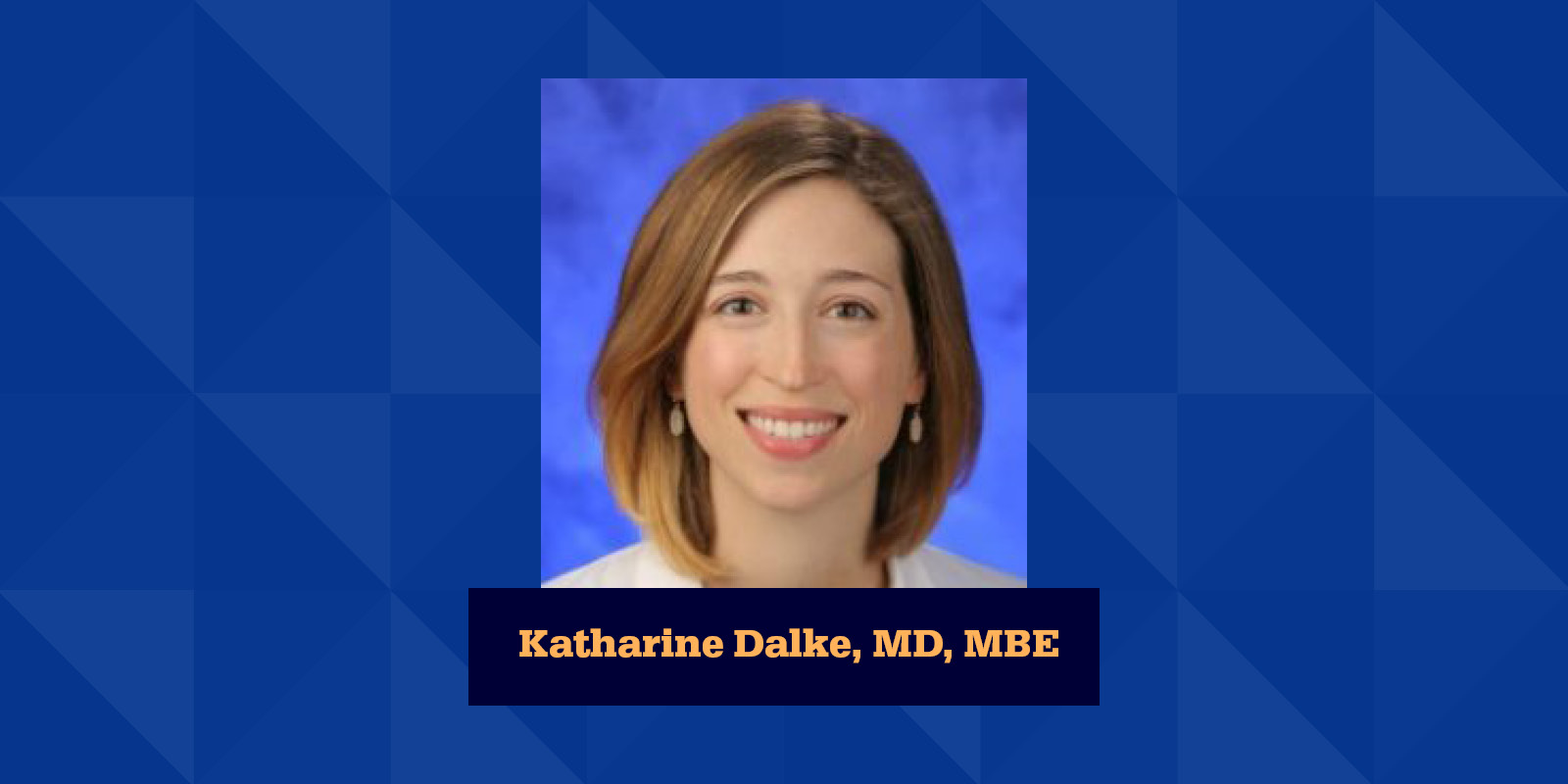
PPI, an LGBTQ Ally – Dr. Dalke Explains
This month, Katharine Dalke, MD, MBE, celebrates 5 years at Pennsylvania Psychiatric Institute (PPI). She started her time at PPI in the inpatient unit, and moved to outpatient in 2019, where she worked in the dialectical behavioral therapy (DBT) program while building her own clinic for LGBTQ patients. Wearing several hats, she is also the Director of the Office for Culturally Responsive Health Care Education and an Assistant Professor of Psychiatry and Behavioral Health and Humanities at Penn State College of Medicine.
From the beginning, her goal was to build out the LGBTQ program at PPI. Though it took time to build over the years, next month, she will be able to fully transition to running the LGBTQ clinic. Dr. Dalke explains: “The LGBTQ clinic is an outpatient program where we help patients who identify as part of the LGBTQ community with mental health evaluation and treatment with a supportive and affirming care team.”
“I identify as queer and part of the LGBTQ community. Growing up I received mental health and medical care that felt traumatic from providers who had the perspective that being queer meant something went wrong with me. But I also had good experiences with providers and realized how powerful these good experiences could be. Good experiences help people feel good about themselves and live the lives they want. This became the driving force in my career path; I went to med school because I wanted to be a helpful, positive force in someone’s life.”
The year Dr. Dalke finished med school, a landmark report was published on LGBTQ health. Prior to that point, doctors were focused on the physical aspects of LGBTQ medical care – like HIV/AIDS, gender affirming hormones and surgery, and cancer – but the report found that the biggest issue for this community was mental health, with much higher rates of problems such as depression, PTSD, suicidal thoughts and eating disorders.
“I went into psychiatry training at a time when the field was appreciating in a better way the health disparities in the LGBTQ community. In addition to providing clinical care, I also want to help with LGBTQ education and systems advocacy. Patients interact with a network of people, each working to help them in a different way. My goal is to train providers on how to make care safer, more effective, and more affirming for LGBTQ+ people. If I can be part of training myself out of a job, that would be awesome!”
Dr. Dalke, true to her passion for education, keeps busy with her work. She leads a training each year for PPI staff as well as education efforts with Penn State Health, teaching medical students, residents, and most recently, leading a Project ECHO on LGBTQI+ inclusive care, for which 100 people are currently registered from across the region and to the UK.
At PPI, the LGBTQ clinic provides care to people dealing with:
- Distress associated with gender or sexuality. Though many people explore their gender and sexuality without problems, some people feel anxious, depressed, or overwhelmed. If a patient is struggling with their gender or sexuality, they can be referred to the clinic to talk with Dr. Dalke. She can talk help them pull apart the different aspects of their feelings to better understand and improve their mental health.
- Family members can also take advantage of the clinic to help them understand what their loved one is going through and how they can support them. “Many parents need support in order to support their child. This is why we also help families and loved ones. There is evidence that supportive families significantly lower the risk of suicide, poverty and self-harm for LGBTQ youth – that is more important than any prescription I can write” notes Dr. Dalke.
- Gender Affirmation. Transgender patients may need a mental health evaluation in order to access gender affirming treatments like hormones or surgery. Fortunately, this requirement is changing for adults, as only being able to receive gender-affirming care “because a shrink said it’s ok” puts power in the hands of the doctor, not the patient. When she meets with patients seeking gender affirmation, Dr. Dalke works to keep them in the driver’s seat, focusing on helping them feel confident in their decisions and doing what she can to advocate for their needs. For adolescents, this also means involving families when possible, as the consent of a parent or guardian is required for gender affirming medical treatment of minors.
- Mental health issues who happen to also be LGBTQ. Sometimes mental health problems don’t relate at all to a person’s sexual or gender identity, but the patient wants to see someone who is culturally responsive and will treat them respectfully.
- In these cases, Dr. Dalke coordinates care with and refers to other LGBTQ-competent providers for psychotherapy or medical treatment.
Dr. Dalke emphasizes that the majority of those who identify as LGBTQ do not have any mental health issues. Those that do are at an increased risk for depression, anxiety, trauma (from rejection, harassment, violence, and/or sexual violence), eating disorders, substance abuse, suicidal thoughts and PTSD.
In practice, these mental health issues look like a reaction to stress. Studies have shown that stress drives these risks, and that this stress is heavily related to the stigma that LGBTQ patients face. “You can think of it like discrimination and racism towards people of color,” explains Dr. Dalke. “When society says someone’s identity is wrong, it drives up their stress levels and affects their mental and physical health.”
“Currently at PPI we only see people individually, though I hope to develop group services one day. Whenever possible, we recommend excellent community support groups to our patients. As one of the only psychiatrists who focuses on this community outside of Philly and Pittsburgh, my schedule is limited to accommodate as many people as possible, so I generally meet with patients no more frequently than once monthly. This is why I make sure that my patients also have regular visits with their therapist.”
When asked about successes, Dr. Dalke was excited to note: “I’ve enjoyed a lot of successes! Some of these include seeing PPI’s interest in and ability to provide excellent care for LGBTQI+ patients grow hugely over the last several years. For example, we’ve worked with program leadership to ask every patient who comes for outpatient services about their chosen name, pronouns, sexual orientation, and gender identity. I’ve also observed tremendous growth in comfort and skill among our staff with this information. It’s also been hugely gratifying to walk alongside many patients long enough to really see them achieve their goals and move from crisis to recovery to thriving. That’s worth more than anything!”
Looking forward, Dr. Dalke plans to continue her efforts: “Expanding services is my number one goal for 2022. I hope to grow this clinic by hiring a therapist for our LGBTQ patients and to continue to expand capacity in the region for care.”
Curious about learning more? Check out these references:
- 2020 PA LGBTQ Health Needs Assessment
- GLAAD Media Reference Guide – 11th Edition
- GLAAD Media Reference Guide – LGBTQ Terms
- org Resources on Personal Pronouns
- Home New (centralpalgbtcenter.org)

